Key takeaways:
- Justice should incorporate compassion and understanding, emphasizing healing and redemption over retribution.
- Redemption is a transformative journey that allows individuals to grow, highlighting resilience and the ability to change.
- The death penalty raises ethical concerns regarding wrongful convictions and reflects a tendency towards punishment rather than rehabilitation.
- Flaws in the justice system include biases based on socioeconomic status and inadequate mental health resources, compromising fairness and accuracy.
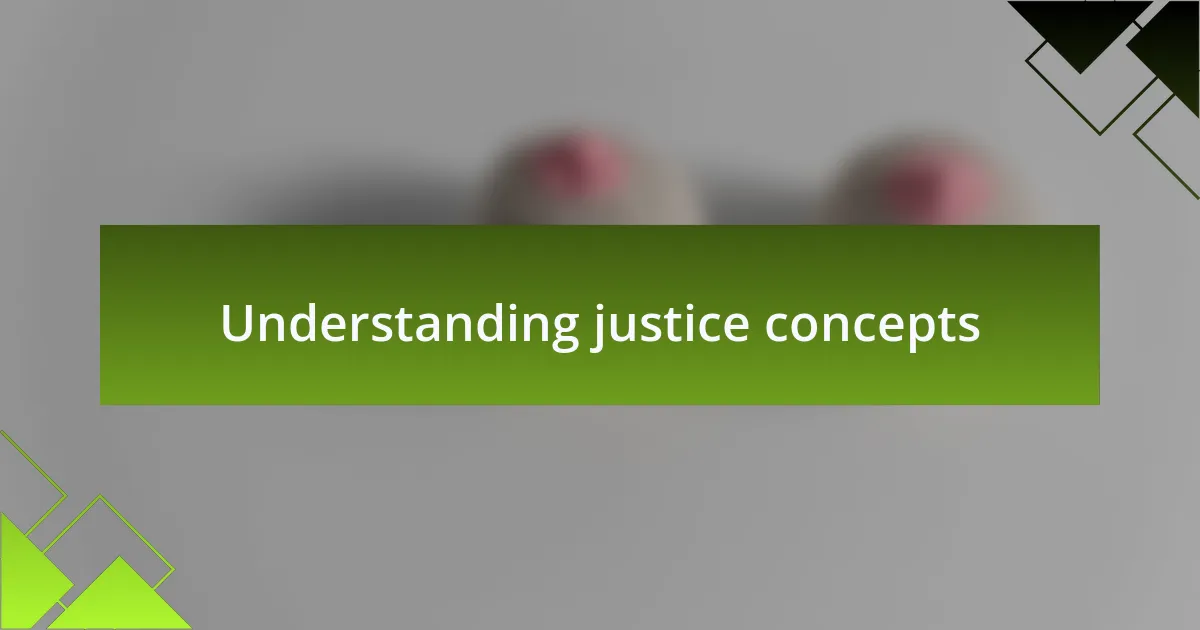
Understanding justice concepts
Justice is often thought of as a rigid concept grounded in law, but for me, it’s more nuanced and deeply personal. I remember a time when I witnessed a friend face the consequences of a mistake that could haunt him forever. It made me question whether true justice can exist if it lacks compassion and understanding of the human experience.
When discussing redemption, I often reflect on stories of individuals who have turned their lives around. Isn’t it fascinating that someone can evolve from expressing rage to embodying forgiveness? I believe this transformation doesn’t erase their past but adds layers to the idea of justice—making it more about growth rather than mere punishment.
Moreover, our justice system sometimes seems to overlook empathy, focusing instead on retribution. I often wonder, what if we prioritized healing over vengeance? In my view, acknowledging the potential for change in every individual could reshape how we define justice, moving us closer to a society that truly understands the complexities of human behavior and the possibility of redemption.
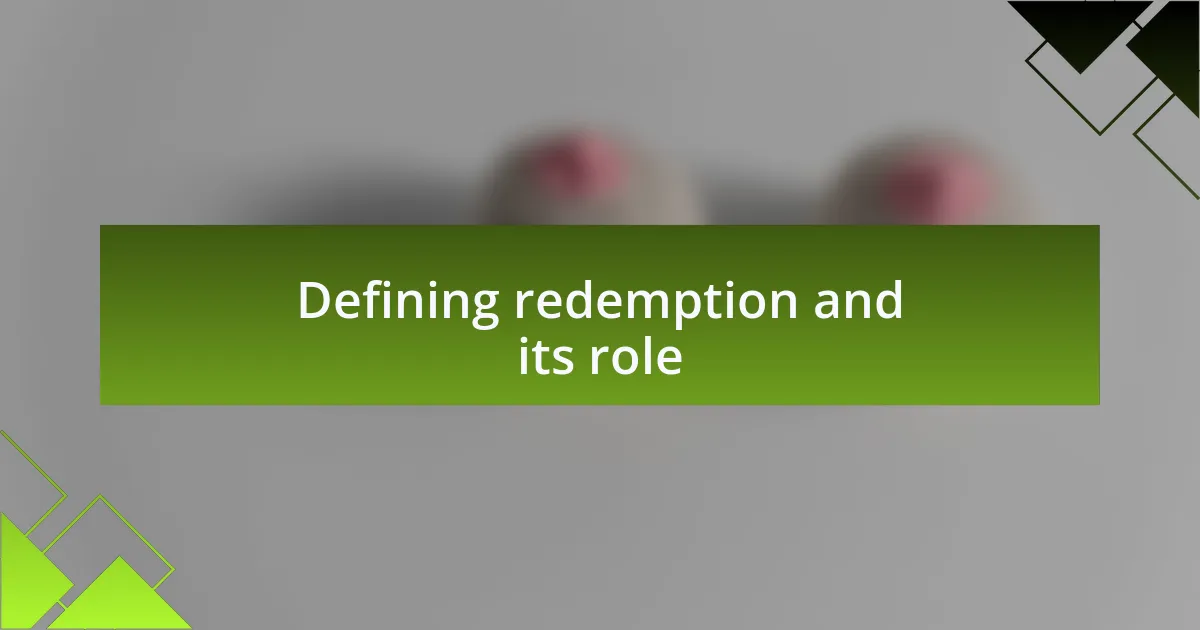
Defining redemption and its role
Redemption, in my eyes, is about more than just a chance to make amends; it’s an opportunity for a profound transformation. I often think about a former classmate who, after years of grappling with addiction, found solace in helping others facing similar battles. It’s inspiring to see how, through his struggles, he not only repaired the fragments of his own life but also became a beacon of hope for others. Isn’t that what redemption is truly about—a journey that highlights resilience and the capacity for change?
The role of redemption in the broader context of justice is equally significant. I recall a documentary that showcased individuals wrongfully convicted of crimes, many of whom dedicated their lives to reforming the very system that failed them. Their stories made me wonder: how often do we allow room for redemption in our understanding of justice? By acknowledging these narratives, we open the door to a justice system that values humanity and restoration rather than simply punishing mistakes.
To really grasp the essence of redemption, I believe we must challenge ourselves to redefine what it means to be “forgiven.” When I think back to my own experiences of making mistakes, I realize that the path to redemption is paved with empathy—not just for others, but for ourselves as well. This creates a ripple effect; when we lead with compassion, we encourage others to embrace their own journeys of healing and transformation.
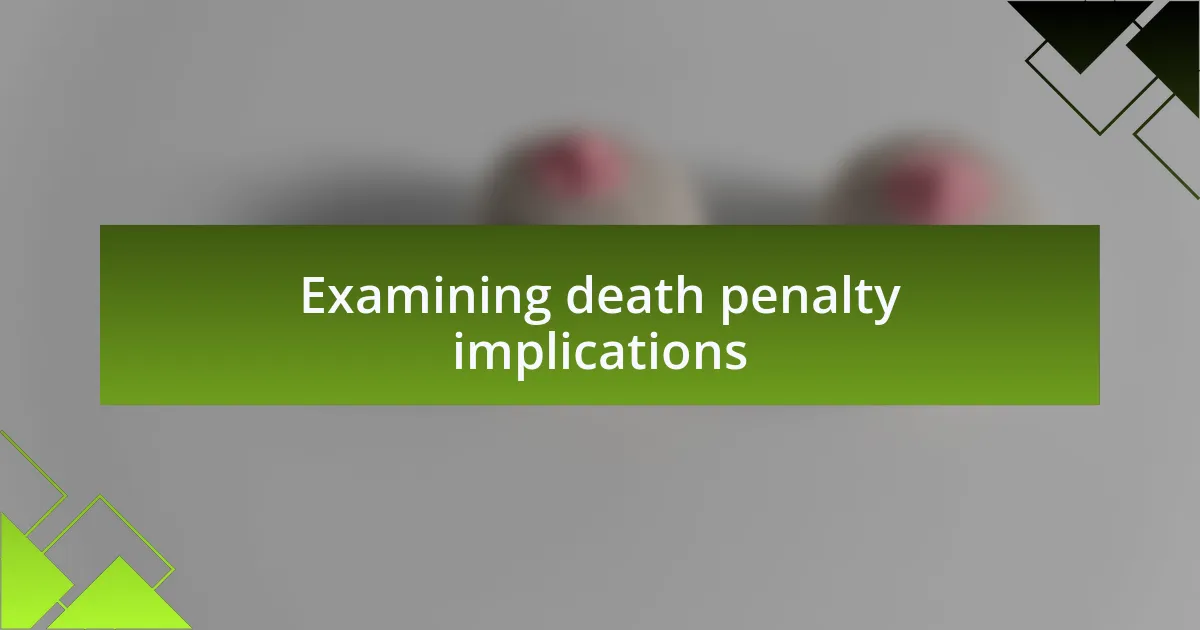
Examining death penalty implications
The implications of the death penalty extend far beyond the act itself; they permeate the fabric of our justice system. Reflecting on a case I once followed closely, I realized that the true cost of executing an individual can ripple through families and communities for generations. When a life is extinguished, who bears the weight of that loss? I can’t help but feel that embracing this understanding opens our hearts to a more compassionate evaluation of justice.
Moreover, the uncertainty of guilt in capital cases raises ethical dilemmas that shouldn’t be ignored. I remember reading about a man exonerated after spending years on death row, and it struck me deeply how fragile our grasp on justice can be. His experience made me question—shouldn’t our legal system err on the side of caution? When we consider the irreversible nature of execution, it feels imperative to champion a system that prioritizes accuracy over finality.
Finally, the death penalty symbolizes a societal inclination toward retribution rather than rehabilitation. I recall discussing this point with friends, who argued about the necessity of punishment versus the potential for change. The conversations we had revealed a divergence in beliefs about justice: should we not strive to uplift rather than annihilate? Our discourse pushes against the boundaries of traditional thinking, suggesting that embracing reform might lead to more profound justice than retribution ever could.
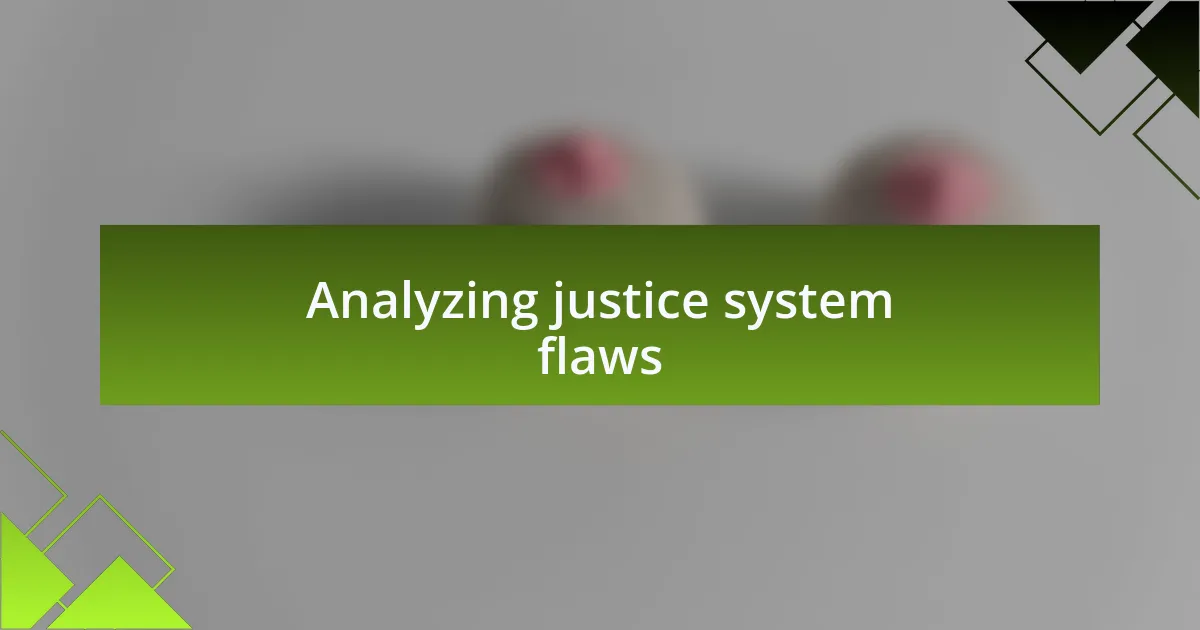
Analyzing justice system flaws
One significant flaw in the justice system lies in its inherent biases. I once volunteered at a legal aid clinic where I witnessed firsthand how socioeconomic status often determined the quality of legal representation a person received. It left me pondering: how can we claim to uphold justice when a defendant’s fate is tied to their financial stability?
Additionally, the pressure to secure convictions can lead to devastating mistakes. I remember reading about a detective who, in his zealous pursuit of a suspect, overlooked crucial evidence that could have proven innocence. The realization struck me—how many lives are ruined by a system more focused on winning cases than uncovering truth? This situation underscores the need for a justice system that prioritizes fairness and accuracy over expedience.
Moreover, the lack of mental health resources within the system often means that individuals facing charges are not given the support they need. In a recent discussion with mental health advocates, we reflected on how many individuals charged with crimes are battling untreated mental illnesses. This begs the question: shouldn’t a just society provide treatment and support rather than punishment for those struggling with their mental health? The complexities of human behavior should drive us toward compassion rather than retribution.
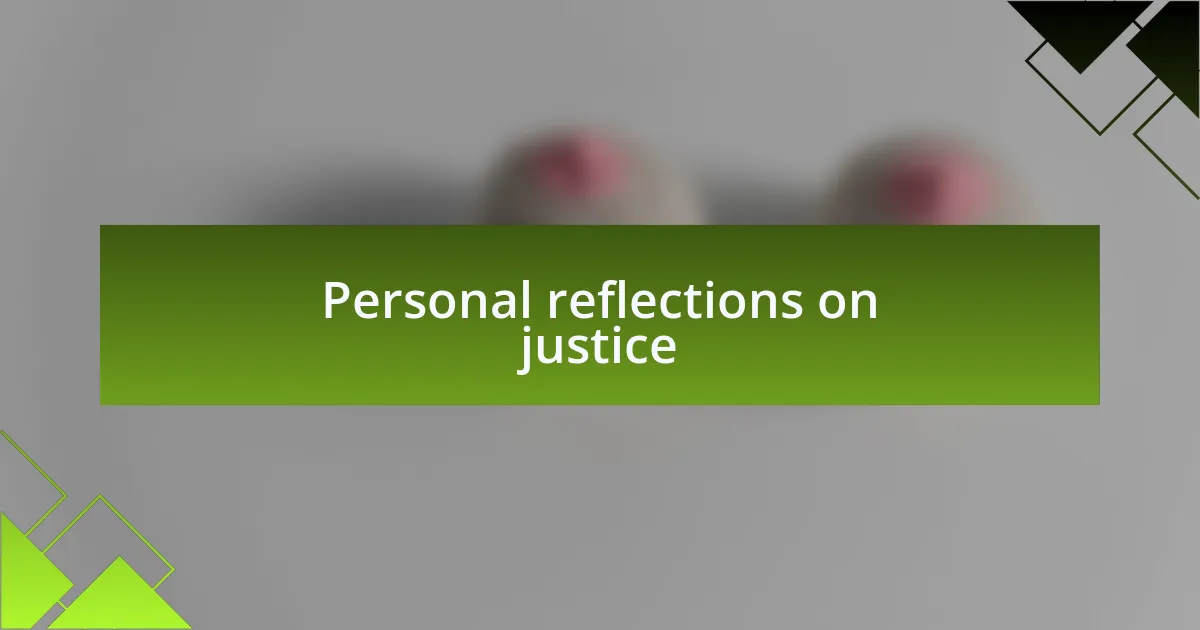
Personal reflections on justice
Justice is a multifaceted concept that often feels out of reach. I recall a time when I watched a friend grapple with the aftermath of a wrongful conviction. Seeing the toll it took on his mental state made me realize that justice isn’t just about punishment; it’s about restoring dignity and hope. How can we truly call our system just when it can inflict such deep scars?
Experiencing a community court session opened my eyes further to the essence of restorative justice. I witnessed individuals sitting together—victims and offenders—seeking to understand one another’s perspectives. This interaction made me question: shouldn’t healing and understanding take precedence over mere retribution in a just society? It felt like a powerful step toward redemption, emphasizing that justice can lead to joint healing rather than separation.
In my reflections, I often wonder if justice is as much about the outcome as it is about the process. I once spoke with a former inmate who described his journey toward rehabilitation. His narrative reshaped my understanding of justice—showing that embracing second chances can create a ripple effect of positive change. Isn’t the ultimate goal to foster growth and transformation in individuals, rather than perpetuating cycles of harm?
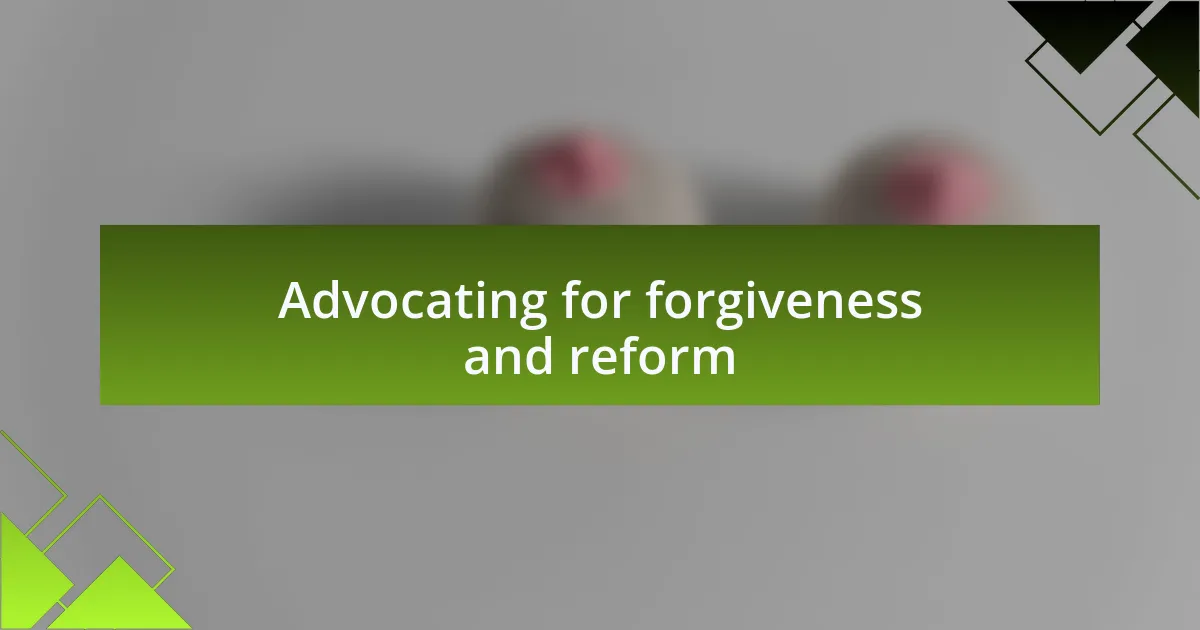
Advocating for forgiveness and reform
Advocating for forgiveness and reform is essential in creating a more just society. I remember a poignant moment when I volunteered at a local rehabilitation center. Listening to the stories of those seeking redemption, I was struck by the common thread of regret and hope. This experience made me realize that forgiveness can pave the way for reform, allowing individuals to rebuild their lives and contribute positively to society.
One encounter that stands out to me involved a young man who had made serious mistakes in his past. As he shared his journey toward redemption, I couldn’t help but feel a sense of empathy for him. His vulnerability and earnest desire to learn from his wrongs reminded me that everyone deserves a second chance. Isn’t it our responsibility to create pathways for people to re-enter society with dignity and purpose instead of stigmatizing them for past transgressions?
In advocating for reform, we must consider the profound impact of our choices on individuals and communities. I often reflect on how society’s approach to justice favors punishment over growth. Isn’t it time we shift our narrative to one that emphasizes healing and accountability? By embracing forgiveness, we not only support individuals in their journeys but also foster a more compassionate community overall.